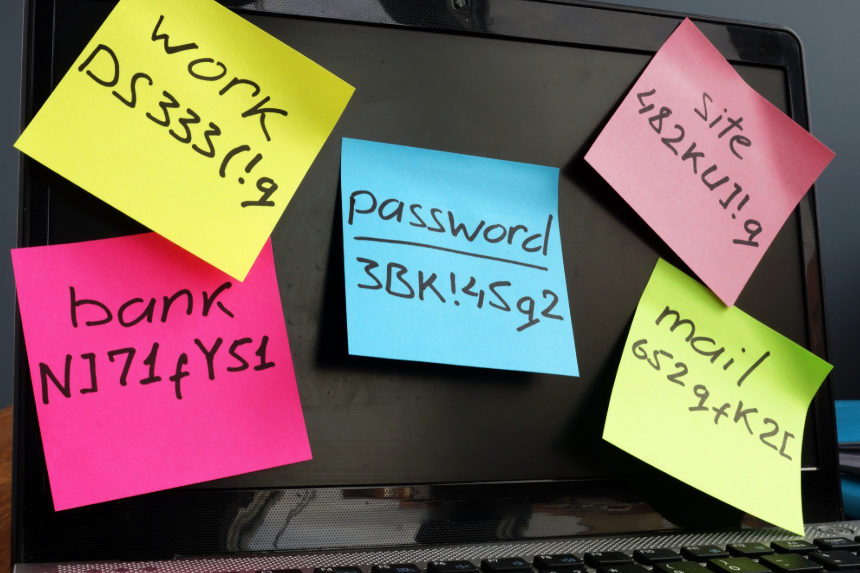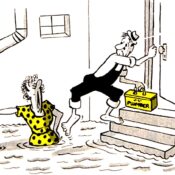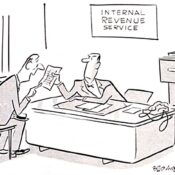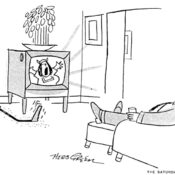I’ve never gone in for experimental prose. Call me old-fashioned, but I like the basics: structure, coherence, grammar — things like that.
But looking back over my life, I realize I’ve spent countless hours composing edgy, modernist words: random strings of numbers and letters that make a mockery of all meaning. The very sight of them evokes feelings of nihilistic despair.
I’m not trying to be artsy. In fact, I don’t want to make up these words at all. Yet, unless I constantly remember or invent new computer passwords, I am locked out of almost every aspect of my life.
Log into my work laptop? I have to type 52cHeezeball# or no dice.
Pay my kids’ school lunch accounts? 52cHeezeball_@!
Purchase household supplies online? 522CHEezeBALL+++
Check my email? cheezeTOTHEballTOTHEcheezecheezeball_%
Order prints of vacation photos? balmoral*castle(scOTLand)_cheeze?
Watch old sitcoms on streaming video? #princECHARles+cHeeze4ever
Obviously, I can’t remember all these passwords. No one could. When I inevitably forget some random variant of “cheezeball,” I am asked a series of stressful personal questions, a quiz on minor details of my own life:
What was the name of your childhood pet?
Wait, which one? Pass.
Where did you meet your spouse?
Wait, which one? Pass.
What is your father’s mother’s uncle’s middle name?
Um . . . John?
Incorrect! What is your second-favorite food?
Er … tacos, I guess?
Incorrect! Why did William Shakespeare’s last will and testament provide for his wife, Anne Hathaway, to inherit his “second-best bed”? What was Shakespeare implying exactly? Was this some kind of diss to Anne?
Well, scholars disagree —
Incorrect! What is your sun sign in the Zodiac astrological system?
Virgo.
What house is that sign’s ruling planet in right now?
I don’t really keep track of —
You have made too many incorrect guesses. Your account is now locked for suspicious activity. Please contact customer service.
How did we get here? When I was growing up in the 1970s and 1980s, people conducted business in person. If you wanted to buy something, you dragged a squirming child to the store, paid with cash or check, apologized for the mess your child made, and left.
For office work, you rolled a blank page into the electric typewriter and started typing — real sentences with subjects and verbs! Not gibberish.
I first needed a password in college to use the school computer lab. “No problem,” I thought. “I’ll just use ‘cheezeball,’ a simple term I can hold in my fresh young brain.”
But over the decades, passwords horribly multiplied and morphed until we reached the present state, which some have described as a “nightmare.”
That’s a quote from Fernando Corbató, who created the first computer password as a scientist at the Massachusetts Institute of Technology in the early 1960s. In a 2014 interview with the Wall Street Journal, Corbató — by then a trim, cheerful man of 87 — explained that he was trying to keep researchers from “needlessly nosing around in [each other’s] files.”
But in the 2010s, he said, “I don’t think anybody can possibly remember all the passwords that are issued or set up. That leaves people with two choices. Either you maintain a crib sheet, a mild no-no, or you use some sort of program as a password manager.” Corbató himself kept “three typed pages” of passwords and estimated he had used 150 different ones over the years.
In fact, the use of non-computer passwords dates back to ancient times. One of the earliest recorded passwords was “shibboleth,” a word that makes you sound drunk even when you say it correctly.
In the Old Testament Book of Judges, after two tribes engaged in battle, the winning tribe posted guards at the river so their enemies couldn’t escape. Anyone trying to cross the river was forced to say “shibboleth,” which the tribes pronounced in different ways. One fellow came along and said: “Er . . . sibboleth?” Incorrect! He was promptly slain.
From the beginning, it seems, passwords have been mildly absurd. In 2003, they became more so with the publication of password tips by the National Institute of Standards and Technology. As the Wall Street Journal reported in 2017, the agency “advised people to protect their accounts by inventing awkward new words rife with obscure characters, capital letters and numbers — and to change them regularly.”
These rules were widely adopted by government and corporations, yet the NIST staffer who wrote them, Bill Burr, remarked in 2017: “Much of what I did I now regret.” By then retired and with the benefit of 20/20 hindsight, Burr admitted that constantly-changing passwords, larded with nonsense characters, actually don’t work very well.
Great, now you tell me! When I am neck-deep in the Cheezeball Variations and every function I perform is locked away behind a Cheezeball Wall, or CHeezeWaLL_9$8, because that’s just how I think now.
The most unsettling thing about today’s passwords is that they don’t stand between you and enemy territory or exclusive clubs. Unlike a Roman soldier in 300 B.C., I don’t need a watchword to protect my garrison from barbarian hordes. Unlike in the Prohibition Era, I don’t need a code to get into an underground speakeasy where people are singing “shibboleth” with boozy abandon.
Instead, I need complex passwords to pay the water bill and email my mom. The secret space is my own life, and the codes reside in my own faltering memory. What if, one day, I simply can’t remember “cheezeball”? Is “the cloud” going to recognize me somehow and allow me back into my virtual world? Not likely.
Luckily, there will still be a few who know me without passwords. My husband and kids will not require verification of my identity. My loyal dog will not insist on two-factor authentication.
And when I join the ultimate secret club, I doubt I’ll have to recite random numbers and letters. Passing on will be password-free. I expect it will go something like this:
“Hello, it’s me.”
“Oh, hello! Come on in.”
Featured image: Shutterstock
Become a Saturday Evening Post member and enjoy unlimited access. Subscribe now




Comments
Tips: Use a password manager – you just need to keep up with one password then. Use 2-factor/multifactor authentication – it is a way to re-enforced/harden your security without playing whack-a-mole with passwords. You’ve already embraced technology and need it in your life – why not set yourself up to win?
I hear you, Bob!
It really is a nightmare for all of the reasons you state here. It’s forced me to take to using variations of the same password over and over again! I KNOW I’m not supposed to do that Ms. Sinha, but — —- it, I’ve had to!!